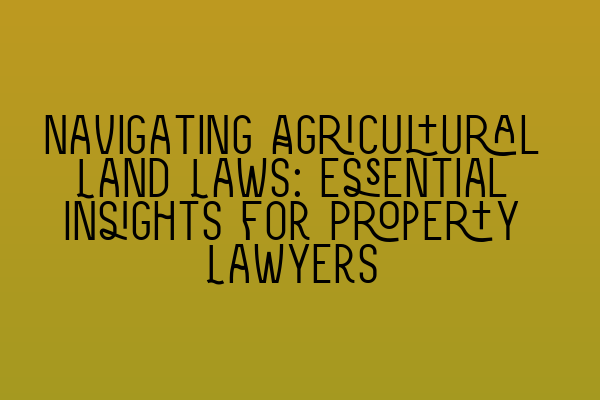Navigating Agricultural Land Laws: Essential Insights for Property Lawyers
As property lawyers, it is crucial to have a solid understanding of agricultural land laws. Whether you are dealing with farm sales, leases, or land-use regulations, having the necessary insights is key to providing your clients with effective legal advice. In this blog post, we will explore some essential aspects of agricultural land laws that every property lawyer should be aware of.
The Importance of Agricultural Land Law
Agricultural land is a unique and valuable asset, and as a property lawyer, it is essential to understand the laws and regulations that govern its use and transfer. Due to the specialized nature of agricultural activities, such as farming and livestock rearing, there are specific legal considerations that apply to this type of land. By familiarizing yourself with these laws, you can better assist clients involved in agricultural land transactions and disputes.
Key Laws Relating to Agricultural Land
One of the fundamental legislations governing agricultural land in the UK is the Agriculture Act 2020. This act replaced the previous Common Agricultural Policy and sets out the framework for agricultural policy and subsidy schemes in England. Additionally, the tenancy of agricultural land is regulated by the Agricultural Holdings Act 1986 and the Agricultural Tenancies Act 1995.
When dealing with agricultural land, it is also essential to consider environmental regulations, such as the Countryside and Rights of Way Act 2000 and the Environmental Stewardship Scheme. These regulations aim to protect the natural environment, wildlife, and biodiversity associated with agricultural land, and property lawyers should be well-versed in their provisions.
Common Issues in Agricultural Land Transactions
Various issues can arise when dealing with agricultural land transactions. These may include rights of way, water rights, drainage, boundary disputes, and compliance with agricultural and environmental regulations. It is crucial for property lawyers to thoroughly investigate these matters to mitigate any potential risks or conflicts for their clients.
Understanding the unique financial and tax considerations related to agricultural land is also vital. For instance, property lawyers should be familiar with Agricultural Property Relief (APR) and Business Property Relief (BPR), which can significantly impact the taxation of agricultural land transfers.
Conclusion
As property lawyers, having a comprehensive understanding of agricultural land laws is crucial for providing effective legal advice to clients involved in agricultural transactions. By familiarizing yourself with key legislation, regulations, and common issues, you can better navigate the complexities of agricultural land law and protect your clients’ interests.
If you’re preparing for the SQE exams and looking for additional resources, be sure to check out our related articles:
- SQE 1 Practice Exam Questions
- SQE 1 Practice Mocks FLK1 FLK2
- SQE 2 Preparation Courses
- SQE 1 Preparation Courses
- SRA SQE Exam Dates
